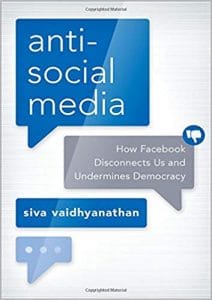In ‘Antisocial Media’, Siva Vaidhyanathan tries to untangle the complex web of social networks, even as they gain increasing control over our lives and polity.
What if you knew that Facebook allowed other firms to collect your data from its site — would you quit it?
Welcome to Facebook’s ‘Open Graph’, a protocol launched in 2010, that allows any other website to collect information about all your preferences on its site. If there is one thing that Facebook and Google know, it is how to make a quick buck. And a quick buck off you.
There — you still wouldn’t quite quit it. Or that’s the case Siva Vaidhyanathan makes when he delves into the architectural and economic logic of the platform in Antisocial Media: How Facebook Disconnects Us and Undermines Democracy. With a low barrier to entry and built to amplify instant gratification, Facebook in its very design is far from being the machine that can steer meaningful connections, reflections, and conversations that might help build a sense of global community — something that Mark Zuckerberg clearly aspires towards.
Easy and breezy, the book guides its readers through metaphors and anecdotes into the complex web of social networks even as they gain increasing control over our lives and polity. Ironically, thanks to Facebook and WhatsApp, most of us now are aware of the infamous Cambridge Analytica fiasco that came to light in early 2018 — the data-mining firm was hauled up for illegally attempting to influence the US elections using the Facebook data of more than 50 million Americans.
Initially used for targeted advertising, Open Graph allows private firms to collect metadata on your socio-political positions and preferences, aligning interests with offers, in order to sustain biases you might already harbour. This opens up a minefield for political analysts who now have clear insights on exactly how to convince you. They could feed on the xenophobia/self-righteousness/racism/Islamophobia/misogyny/economic anxiety so that political campaigns may be designed to drive those fears without any clear plans on the road ahead. The rise of Trump is a case in point.
By November 2017, the full extent of the Russian interference in the US elections — they did it by purchasing advertisements on Facebook and Instagram in a bid to target 126 million Americans — became evident.
But if there is one thing that Facebook does not seem to understand about itself is that it is politics which makes the world go (a)round. And that, unfortunately, can’t be built on algorithmic filter bubbles which can become echo chambers for hate campaigns or fake news. For example, live videos of suicides and homicides, alternative facts, revenge porn, source-less information parading as facts, rhetorical stunts among others also constitute the endless cycle of social media feeds. Amusement by itself is not a folly if not for the fact that it has increasingly become the only way in shaping how we look at the social landscape.
If pleasure and affirmation are the currencies Facebook deals with, it successfully barters populism for rational debates, amplification for deliberated and mediated parleys leading to an unbridled rise of celebrity culture and popular politics through an “attention economy”.
Fostering unrelenting engagement on Facebook has wrecked political and communal havoc worldwide instead. India, Indonesia, Kenya, Poland, Hungary, and the United States have witnessed Facebook-fuelled authoritarianism, violent ethnic and religious nationalism and erosion of democracy.
This set the American government scramble to its feet. First came the equivalence of TV ad regulations that mandated advertising transparency, followed by a dead lull as lawmakers struggled to take stock of the very complexities of social networks. Finally, in late July 2018, journalist David McCabe published a policy paper from the office of Senator Mark Warner outlining at least 20 options available to US policymakers. The paper tries to touch upon every aspect of social networks, including technology, privacy and data protection.
The flipside of the increase in social media usage is the rise of the surveillance state. The 2013 revelations by Edward Snowden that the security and intelligence services in the US and the UK had managed to tap into the data of Facebook, Google, Apple, Microsoft, Yahoo and other companies showed just how vulnerable Facebook users are to state surveillance power. As long as Facebook retains such a rich source of intelligence, states will try to infiltrate the system. Further, it is hard to maintain integrity of data on third-party servers through law given the distinction between public and private wears thin when it comes to third-party servers.

Arpita Phukan Biswas holds a Ph.D. in sociology from the Indian Institute of Technology-Bombay.






